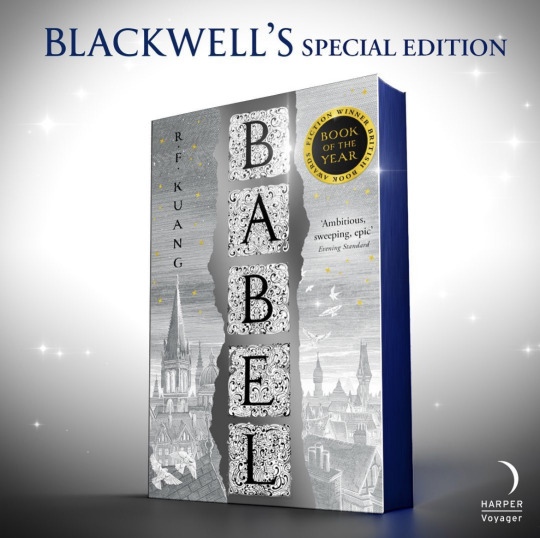Don't wanna be here? Send us removal request.
Text
An Obituary to Ramy
——A Review of R. F. Kuang's Babel
Ramiz Mirza. Ramy to friends.
He dazzled and he stung. His wit and pride, sharp as a blade, were wielded to bring laughter, wonder, respect, discord, uncomfortable truths. Lie, Ramiz. Hide, Ramiz. Underneath his quips, disguise and all, he held tight to his faith in Allah.
He was the one person the quartet could not afford to lose; yet he died at the once loved and trusted hand. Grief and rage followed, then the revolution. When does violence become necessary? To Robin, this was when.
In Babel, or the Necessity of Violence, a 19th-century story set in Oxford, England, Ramiz Mirza from Calcutta is prominently relevant to the demographic makeup of the quartet of main characters. The story starts with Robin in a port of Canton, where the Qing Dynasty drew its last wretched breath before the storm of British colonization. While the Qing and the British company still traded in peace, the latter’s presence had turned malicious on the Indian subcontinent, marked by The Permanent Settlement of Bengal in 1793. The downfall of Oriental civilizations, along with the parasitic relationships with the colonizers (or, ‘patrons’), would later weave a bond between Robin and Ramy, settling them in the irreconcilable differences that colored their faces. And while Robin, being half-white, could pass as normal, Ramy’s brown body (in a gown!) was glaringly laughable. As Babel gradually revealed its viciousness, and as the British Empire kept gorging on foreign lands, a boy from India, the beloved jewel in the British crown, was bound to bear the brunt.
Worse still, Ramy was Muslim – for what are the charms of India but spices, textiles, the Ramayana, the Upanishads? What is the use of expedition, if the hunt for a more exotic Orient landed in somewhere that resembled Persia and the Ottoman, which had been readily relegated to the category of ‘Near East?’ The Persian blood that ran through the Mughal court made the Mughal Empire an aberration, an intrusion upon the ‘sacred’ tradition of Hinduism which was often equated with India. But Ramy, who had faith in the glory of his family and his God, would do anything to defend the pride of his Islamic-Indian identity. He and Letty rowed about this all the time; there could be no mutual understanding between the two parties with their self-absorbing traumas and antagonistic stances. Yet Letty, their English rose Letty, was the only white he could open this argument with. Knowing she was difficult, however, he had not meant to hide from her – never evaded or flinched, even when she clicked the trigger.
I was anticipating him and Letty falling in love, as Ron and Hermione did in Hogwarts. But with the loaded historical-political message on each character and the tensions among them, R. F. Kuang knew better than to resort to the tacky, stale trope of two love-birds getting together despite all their thorns and differences. In fact, one can tell that Kuang, before several tipping points, cleanly steered her narratives away from romance, accentuating instead of reconciling their angry individualities after a flood of emotions. Even when it turned out (I didn’t penetrate this until I read it the third time) that Ramy and Robin were the most likely pair among the four, the narrative’s high pace hurried them to the next conflict without exploding into further revelations. Restrained yet sometimes violent, those undercurrents were packed into their intertwined fates as they were too exhausted just to survive Babel. It serves the narrative.
Partly for the thrill of suspense, the story proceeds with a predominant focus on Robin’s point of view, which makes readers howl and moan about why the close-ups of other characters haven’t come to them earlier. It’s fair given the gripping effect; but if given more parts and spotlight, the others would surely stand more rounded and endearing to readers. Take Ramy – how painfully did he wade through every minute of the Sunday services in a Christian church? How did he manage to worship his Allah? Was there a moment when, the torn division between his façade and identity brought him to a near collapse, just as Robin’s faltering reminiscent of Hamlet? The whole picture of Ramy is broken and scattered as puzzle pieces throughout the footnotes; it’ll take another sequel to put them all in place. Kuang has made the point, again: to write an alternate history is to give representations, retrieve memories, subvert powers, and essentially, to approach truths. The painful yet necessary truths.
But Ramy, dear old Ramy.

3 notes
·
View notes